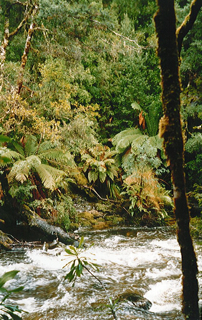
Franklin River, TAS (Winter 2003)
My guess is many of you have read a Tim Winton novel, but I suspect you have never even heard of Richard Flanagan. That’s a pity, because Richard Flanagan is one of Australia’s best storytellers and one of my favourite authors.
Like Winton, Flanagan is deeply affected by the Australian landscape. However, while Winton’s characters usually inhabit the vast, lonely West, Flanagan’s are more likely to be found in the deep wilds of Tasmania.
Perhaps reflecting these different landscapes, I find Winton’s language sparse and dramatic, while Flanagan’s is complex and luxuriant.
Flanagan was quoted in 1995 after the publication of his first novel Death of a River Guide, saying “I wanted something much richer and more baroque that reflected the richness of the spoken language here [in Tasmania] and also the rhythms of the language”.
I’ve only recently finished reading Death of a River Guide, and perhaps my favourite thing about it is the way that Flanagan subverts our stereotype of the ‘white’ Tasmanian (indeed of ‘white’ Australia more generally). His characters internally reflect the diversity of Australia’s indigenous and immigration history, struggling with the way this diversity creates conflict not just between themselves and others but in the process of understanding and imagining themselves.
The Unknown Terrorist, embarrassing to read on public transport because of the images of pole dancers in silhouette on the cover, is a remarkably astute commentary on the implications of fear-mongering by government and media. Set in Sydney, Flanagan neither glamorises this city, nor is he lured into the common temptation of focussing on its ‘grittiness’. Flanagan’s Sydney is real; it’s urban and suburban, it’s diverse and bigotted, it’s beautiful and ugly in equal measure.
Flanagan’s novel Gould’s Book of Fish, famously written in different coloured inks, is both an an extraordinary story of convict era Tasmania and an intriguing reflection on truth and history. Flanagan’s account of the history of Sarah Island is wildly fantastical but when the protagnonist, Billy Gould, stumbles across the official record of the convict colony, this context makes the point so much more clear that official records are not adequate sources with which to reconstruct the past (p285):
The world, as described by Jorgen Jorgensen in those blue-inked pages, was at war with the reality in which we lived. The bad news was that reality was losing. It was unrecognisable, it was inhuman. It was also impossible to stop reading.
I tried to imagine the old Dane at first compelled to reinvent all the barbarity & horror of our settlement as order & progress, material, moral & spiritual, recording it by slipping whale-oil light in his elegant Italianate hand in the official papers of the settlement. It was for him a necessary burden, & at the beginning he probably saw it as trading his life for an incredible & entirely untrue story as he had once traded lies for credit on the gaming tables of Europe.
And then after some time – one year? several years? – perhaps there was a moment so exhilarating that he was forever after imprisoned in its mad liberation, a moment when he first transcended his own consciousness, dipping his quill in demons, & discovering to his fear and astonishment that contained within himself was all men & all women: all good, all evil, all love, all hate, & all time that single moment when his soul exploded into a million beads of vapour through which the light of his imaginings began pouring, refracting into a rainbow of stories made concrete as reports, standing orders, convict incidents, letter books and memoranda.
“Refracting into a rainbow of stories”…. awesome. So, Richard Flanagan — favourite storyteller #1.